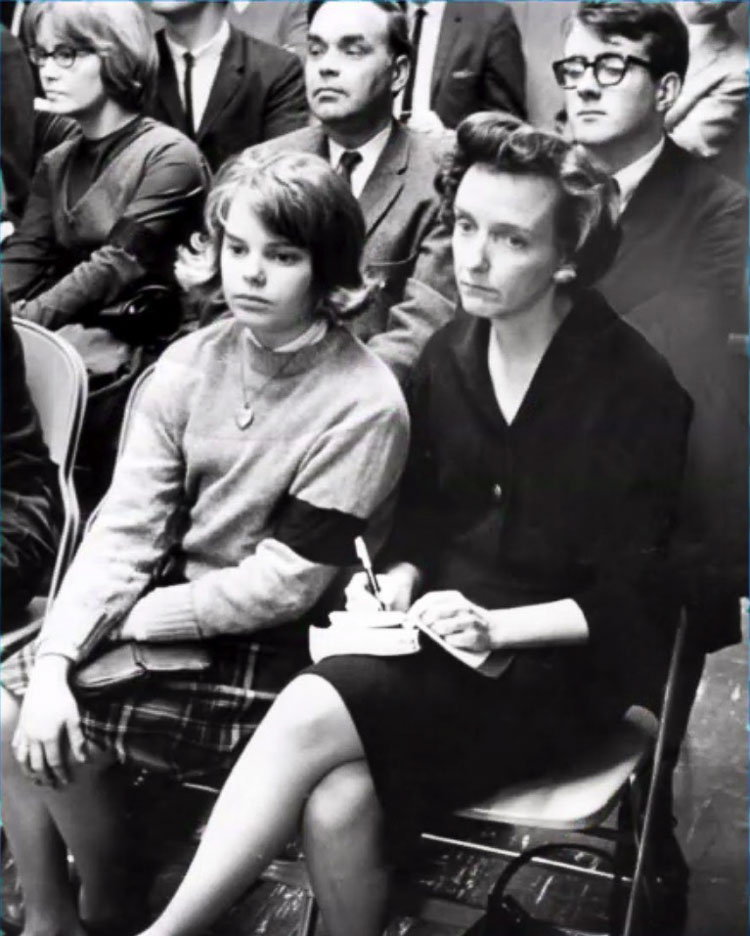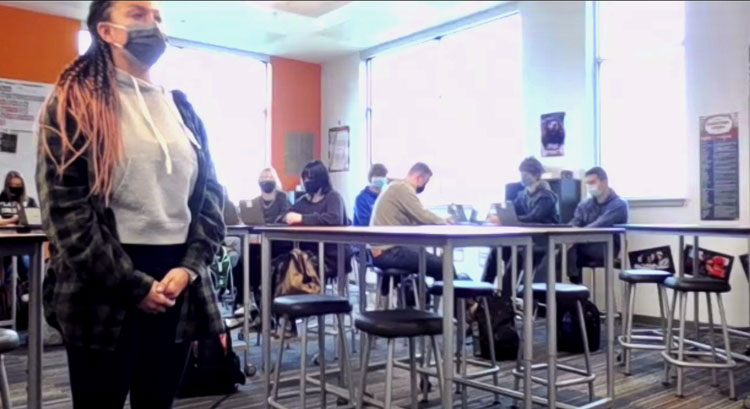Tinker shared her experiences about her Supreme Court case and the years that followed as she became a student rights advocate
Mary Beth Tinker was only 13 years old and still a student when she found herself in the national spotlight and at the center of a Supreme Court case. Recently, Tinker spoke to Ridgefield High School students in Angela Gardner’s social studies class, sharing her experiences about the Supreme Court case and the years that followed as she became a student rights advocate.

Tinker and several other students in Des Moines, Iowa wore black armbands to school in protest of the United States’ involvement in the Vietnam War and to honor both the American and Vietnamese soldiers who had died. While a large number of students had worn the armbands, only five were singled out for suspension, including Mary Beth Tinker and her brother, John. Tinker still has the suspension notice from 1965 and showed it to Gardner’s class. The family received death threats, some of which were specifically targeted at Mary Beth.
The Des Moines school board upheld the principal’s decision to suspend the students. Shortly afterwards, the Iowa Civil Liberties Union filed a complaint on behalf of three of the students – Mary Beth Tinker, John Tinker, and Christopher Eckhardt – in District Court, claiming that the students’ First Amendment rights to free expression had been infringed upon. The complaint was dismissed and went to the U.S. Court of Appeals, where the judges were split. Finally, the Supreme Court agreed to take up the case in 1968.

The Supreme Court found that the Des Moines Independent Community School District had, in fact, violated the students’ First Amendment rights by suspending the students for wearing black armbands. In a landmark decision, the court set a legal standard for free expression for students, saying that students do not lose their First Amendment rights to freedom of speech when they are on school property. In order to justify suppressing speech, schools would have to prove that the conduct would “materially and substantially interfere with the operation of the school.” This substantial disruption test became known as the “Tinker Test”.
Tinker would later go on to become a pediatric nurse but continued serving as an advocate for youth and student rights. In 2013, she started the “Tinker Tour” where she spoke to tens of thousands of students across the United States about youth voices, free speech, and freedom of the press. In 2019, they celebrated the 50th anniversary of the Tinker v. Des Moines case. The Tinker Tour gives her a direct way to encourage students to speak out for what they believe in.
Gardner had seen information about the Tinker Tour and decided to apply when she learned that tour dates were now available via Zoom.
“Tinker vs. Des Moines Independent Community School District is one of the required cases for the AP exam,” said Gardner. “We are also in the middle of our Civil Rights and Civil Liberties unit, so the timing all came together perfectly. It was exciting for my students to hear about this case from one of the individuals who was directly involved!”
The students were excited too, with many questions for Tinker. Charlie Fisher, a founding member of the Unite Ridgefield club, spoke with Tinker about their student-driven social justice organization at Ridgefield High School. Tinker was enthusiastic to hear about the students who were working toward justice and speaking out about the changes they’d like to see.

“That’s what it’s about,” Tinker said. “It becomes a way of life.”
Tinker also shared pages from a First Amendment coloring book she designed for her tours called “Color My Rights!” She pointed out that many of the pages were inspired by student-led activism, including a Girl Scout protest against the use of palm oil (which harms rainforests) in cookies, an elementary school protest against mistreatment of circus animals, and a student-led movement to stop Asian hate crimes. Tinker was clearly proud to see students stepping forward to make positive change in the world.
Students at Ridgefield High School and across the globe will continue to build on Tinker’s legacy, ensuring that students everywhere have the right to be heard.
Information provided by Ridgefield School District.




